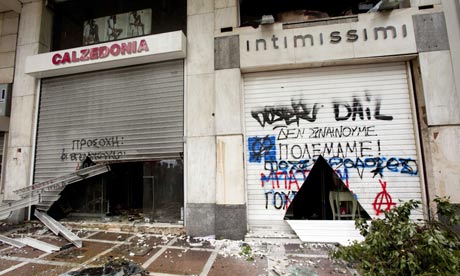The behaviour of the EU states towards Greece is inexplicable in the terms in which the EU defines itself. It is, first and foremost, a failure of solidarity.
The "austerity package", as the newspapers like to call it, seeks to impose on Greece terms that no people can accept. Even now the schools are running out of books. There were 40% cuts in the public health budget in 2010 – I can't find the present figure. Greece's EU "partners" are demanding a 32% cut in the minimum wage for those under 25, a 22% cut for the over 25s. Already unemployment for 15-24-year-olds is 48% – it will have risen considerably since then. Overall unemployment has increased to over 20%. The sacking of public sector workers will add to it. The recession predicted to follow the imposition of the package will cause unbearable levels of unemployment at every level.
In addition the "package" demands cuts to pensions and public service pay, wholesale privatisation of state assets – a fire-sale, since the global market is close to rock bottom – and cuts to public services including health, social welfare and education. The whole to be supervised by people other than the Greeks. An entire disciplinary and punishment system.
When we casually use a term like "bailout", it is important to remember that it is not people who are being bailed out, or at least not the Greek people. The bailout will not save a single Greek life. The opposite is the case. What is being "bailed out" is the global financial system, including the banks, hedge funds and pension funds of the other EU member states, and it is the Greek people who are being ordered to pay – in money, time, physical pain, hopelessness and missed educational opportunities. The relatively neutral, even stoic, term "austerity", is a gross insult to the Greek people. This is not austerity; at best it is callousness.
On top of this callousness, we must remember that the strategy itself is nonsense. Every intelligent observer is agreed that cuts do not produce growth. The highest rate of growth in the EU at present is in Poland where massive public investment is driving the economy. GDP is declining or barely moving among the "austerity" nations, including the UK.
In essence, this crisis is a failure of the EU states to show solidarity in the face of an onslaught from the financial markets. At first glance this seems to be a very simple fight. In one corner you have nation states, which have the wellbeing of their citizens as their raison d'être; in the other you have global capitalism as represented by the financial markets, which has the wealth of a tiny few as its raison d'être. But the nation state has, for a considerable time, identified itself with those same markets. States have agreed to see themselves as economies rather than societies. More recently we have been led to believe that the market alone can provide everything the citizen needs and much more efficiently than the structures that the citizens normally rely on and which they have, over generations, erected as protections against the revenge of the market.
This is the triumph of capitalism, that it has persuaded the world that capitalism is the world.
It has led to the undoing of 200 years of struggle between ordinary people and the super-rich. Trade unions didn't appear overnight, they were a response to exploitation. Their defeat has led to the ubiquity of precarious, and now free, labour. Workers are not protected in their workplace by capitalists, they are protected by the laws won by struggle against the capitalist. A sweatshop in China is a direct assault not just on the rights of the Chinese worker but on those of workers in, for example, the UK. Socialist internationalism and solidarity were conceived as a way of defeating that ploy. Old people do not die in the streets not because charity has saved them but because 200 years of struggle has brought us the old age pension and public health. The privatisation of those services is a return to the 19th century. None of this public good would have been won if people had identified with the super-rich of 1812. Now that we have been brought to such an identification, we stand to lose them all over again.
Now we see capitalism at its most triumphant. Greek police beat Greek people in order to impose the will of the banks and hedge funds. The EU member states, including Ireland, are the middleman, the quislings of capital. Rather than reach out a hand of solidarity, we say, "better them than us". As if the global markets will choose to pass on Ireland once Greece has been destroyed. Solidarity is not just compassion for one's fellow man; it is also materialist self-interest. One for all and all for one. We stand or fall together. There is strength in unity.
Instead we have decided to sacrifice the Greek people to the market in the hope that our sacrifice will appease the gods of speculation. We condemn them to misery and poverty to keep Standard & Poor's off our backs. But we have miscalculated. Firstly, the communist left currently stands at 42% in the polls, Pasok at 8%. Pasok (the leading party in government) will vanish and a combination of real leftwing parties will win the next election. They will not bend the knee and put their necks on our block.
It seems to me now that Greece will withdraw from the euro and default on its debt. Who knows what will happen to it then, but it can hardly be much worse than what we want from them, and at least it will be something of their own choosing. The speculators will then take a little time to consider which of the other economies to bet on. Perhaps then the Irish government will regret its lack of solidarity. Whatever happens, our behaviour and that of our EU compatriots has been shameful.
• Follow Comment is free on Twitter @commentisfree













Comments
14 February 2012 11:53AM
This article is highly slanted, and fails to mention that Greece submitted deliberately falsified accounts to the EU year after year.
Europe has not betrayed Greece, Greece has betrayed the EU.
14 February 2012 11:54AM
Greek sovereign debt has nothing to do with hedge funds or speculators, sir. The simple fact is that the country has spent hugely beyond its means, and it can't pay back the money it borrowed to finance it.
The situation is brutal, though.
14 February 2012 11:54AM
No, the markets looked at the numbers and drew the only possible conclusion.
14 February 2012 11:54AM
Maybe if the Greeks had done the simple things like paying taxes and not retiriring in their 50s then maybe, just maybe they wouldn't be in this mess.
Just a thought.
Obviously a mad one because it's so clearly the fault of global capitalism.
14 February 2012 11:55AM
Don't worry. Greece is only the first.,
14 February 2012 11:56AM
Why are the results of a Socialist Govermnet's out of control spending any reflection on the viability of capitalism?
14 February 2012 11:56AM
Getting less paid is hard and shouldnt be needed....but less is still better then nothing. Greece need stuff from outside. When out of €...who will take Drachma? Who will give Greece any credit?
14 February 2012 11:57AM
I prefer this analysis.
http://www.greekdefaultwatch.com/2012/02/greeces-choice.html
14 February 2012 11:59AM
Don't feel so bad - the Greeks are going to screw the EU in return
14 February 2012 11:59AM
I have the feeling that bankers in the executive suite on the 50th floor are smoking cigars, watching on and laughing about it all........It is the poor who are fighting each other in the police and the people.
14 February 2012 12:00PM
This article seems about right to me. I'm all for internationalism and a politically and financially united Europe, but it depends what it's based on and in whose interests it is united, and at present you don't get the impression that governments are acting in the general public interest.
International finance isn't my forte, but I haven't yet heard an explanation of the authority of Standard & Poor's. If I downgraded Italy's credit rating, nobody would take any notice. Why can't there be the same reaction to Standard & Poor's?
14 February 2012 12:00PM
- socialist
Socialist Market System is not euqal with fail....
14 February 2012 12:00PM
You can only be a 'victim' of your creditors if you borrow more than you can pay back. Some of Greece's creditors have agreed to not to be paid back in full.
While I might agree that the idea of a single European state is being buried by a lack of European solidarity I think there is another lesson. Live within your means.
14 February 2012 12:02PM
So what would you have the EU do instead?
Cancel all Greek debt?
Hurrah.
Oh, now everyone else wants their debt cancelled too. After all it's only fair.
I think the Greeks were deliberately let in despite everyone in question knowing the accounts were dodgy purely so this situation would arise and they could chose to either become a slave state or a third world one.
That's how lovely this EU 'project'' is.
14 February 2012 12:02PM
They don't have to. They can do an Iceland and give the creditors the finger. Iceland, after its bankruptcy, is actually doing quite good, all things considered. Which pains me a bit to admit because I was very insistent back then, that a bankruptcy would send Iceland back to the dark ages.
Let's hope so. I'll probably have to pay the bill one way or another, but at least that would throw a spanner in the EU federation machine.
14 February 2012 12:02PM
Well, let's start with some good news.
EU funds to cover Thessaloniki metro extension
Now, lets look at how much bigger that good news could be
Delays in absorption of EU funds
The European Commission is closely monitoring 181 projects in Greece, for which some 11.5 billion euros will be dispersed. While much of this money is going toward infrastructure schemes, 4.3 billion euros is being allocated through the European Social Fund for projects to help with employment.
However, Kathimerini understands that of these 4.3 billion euros, more than 1.1 billion has not yet been absorbed despite the unemployment rate surpassing 20 percent in November. The schemes are meant to be overseen by the Education and Labor ministries but they are finding it difficult to get the projects off the ground.
The Labor Ministry says that the schemes it is responsible for were to be run by the OAED employment organization, but sources said that it is too weighed down at the moment dealing with the rapidly increasing number of unemployed Greeks. The total figure of Greeks without jobs passed the million mark in November.
As for the Education Ministry, sources said that staff shortages are making it difficult for officials to plan the programs that will absorb the EU structural funds which Brussels has made available.
14 February 2012 12:03PM
its the greece politicians who brought this problem on them selves they should have never joined the euro.
14 February 2012 12:03PM
These are the ones having to take 70% write downs on the Greek debt they are owed by the democratically elected Greek government which was quite happy taking money off them to spend on the electorate who were quite happy to vote for them. If you borrow money you should pay it back. Greeks still have far better living standards that those in many developing countries that have to pay back their borrowings.
70% write down. Hardly being bailed out. It is the publically owned IMF and ECB which aren't having their Greek debt holdings written off. The largest private holders of Greek government debt are the Greek banks whose shareholders have already been effectively wiped out. Yes you could do a 100% write off but who would pay the price. Any Greek who had put money in them for their savings. Ordinary Greeks might also be a bit upset when their cash machines stopped working.
Is it really that terrible that pension fund managers want to try to retain as much of their investments in Greek bonds as possible for their unit holders, the pensioners of tomorrow?
14 February 2012 12:04PM
Given that the drachma would immediately devalue as an act of normalisation, I imagine that an awful lot of tourists would be the first to take an interest in the new drachma and the very cheap holidays it would suddenly offer - huge stimulation of tourism is one of the advantages of leaving the Euro immediately.
14 February 2012 12:05PM
It does seem incredibly harsh. I wish we could help, but what can we do?
14 February 2012 12:05PM
I don't see how you equate a dictatorship allied to multinationals with 'capitalism'. Is 'capitalism' your shorthand for 'anything that isn't socialism'?
14 February 2012 12:06PM
So I suppose that after Iceland wrote off all its debts, there was a Global outcry from everybody to have their own debts cancelled too?
14 February 2012 12:07PM
Funny, I though the whole scam was to bail out the banks that are needed to lend to the governments of the eurocracy so that the politicians can make more endless promises to their welfare/warfare constituencies. Is that what you call free market capitalism then?
14 February 2012 12:07PM
This crisis has nothing to do with Capitalism. I remember that the sternest warnings about the Eurozone economy came from those most supportive of capitalism and ignored by those most opposed.
I also remember far left 'anarchist' groups rioting around the time of the olympics about a reduction in spending.
No, this is was an entirely avoidable situation that sucsessive Greek governments ignored or failed to articulate accurately to the people. The competition gap with Northern Europe, the growing defecit, the unreformed public sector, and the weak social atitude around taxation is reponsible
And so, we're living in the reality so clearly argued by the 'swivel-eyed' 'little englander' 'xenophobes' that you can either devalue the cureency to price Greece back into the market or you can transfer money across national borders. Both situations utterly unacceptable to the Germans who, naturally enough, feel no kinship with the Greeks.
Default, decouple and short trerm disaster are the only reasonable options left now and I pray to God that the idealogues of the last decade take time to reflect on the harm they've visited on millions of innocent European citizens.
14 February 2012 12:08PM
I think you'll find it was Goldman Sach's accountants who cooked the books and did very well for it.
14 February 2012 12:10PM
The EU, not "Europe" betrayed Greece the moment it fiddled the figures and let it join the Euro.
Something that was cheered on by this very newspaper IIRC...
14 February 2012 12:10PM
Lives of people readily sacrificed for money and control. This is not capitalism. This is colonisation, by debt, and years in the making.
14 February 2012 12:11PM
Greece MUST leave the Euro.
14 February 2012 12:12PM
It will be hard to keep S&P off the backs though, as the total external debt of most European countries is increasing exponentially.
http://en.wikipedia.org/wiki/List_of_countries_by_external_debt
14 February 2012 12:12PM
Indeed. And even our malignantly neutral gaze falls within its commodifying reach. As Debord stated, The spectacle presents itself simultaneously as all of society, as part of society, and as instrument of unification. As a part of society it is specifically the sector which concentrates all gazing and all consciousness. Due to the very fact that this sector is separate, it is the common ground of the deceived gaze and of false consciousness, and the unification it achieves is nothing but an official language of generalized separation.
14 February 2012 12:12PM
The only just solution is for Greece to default. Why prop up the banks and the eurocracy through a political debt restructuring - the free market would never support this. What short term relief that Greece would enjoy in a restructuring of its debts will be far outweighed by the longterm stunting of its society. The more we try to prop up the vested interests of the bubble years, the more we will drag on the depression - that applies equally to Greece and the rest of us, whatever the Keynesians and monetarists promise.
14 February 2012 12:12PM
This usage of "The Greeks" suggests that all Greek people somehow have a hand in this.
It makes you wonder if anyone from other countries lump us together as "The British" because we are seen to blame for electing corrupt politicians and banking system which happily gambles other peoples money and has a history of lending it where it shouldn't all over the EU, in fact all over the world, Greece even. And through bailouts we are all paying for this in cuts in healthcare and infrastructure, indeed, while our financial 'industry' (if you could call it that) gets fat on bonuses, the most vulnerable in our society are victimised.
Yet if the news reports are to be believed as representative, many British people are a lot calmer about this sort of thing than many Greek people.
Perhaps we shouldn't be.
14 February 2012 12:14PM
Im from Germany (hide behind wall =P )....I personaly have no hollydays plans but f.e. I play Handball. Some of my team had the idea to make hollidays in Greece....sort of helping. After the last weeks and news from there, like a man on street telling to german tv "i dont want to see germans here anymore", they changed their mind. They will go now to Spain.
Also i got told by friends, which was in Greece and Turkey, that Turkey is not just cheaper, but also have the modern and newer Hotels. So even when Drachma will fall. This friends still will prefer Turkey. (i hope i write Turkey right).
Now you could say, that just the germans...who need them ^^. Till now, we germans the largest income in greece tourism.
14 February 2012 12:15PM
the lack of solidariy the article is talking about is very evident even in the comments here i'm afraid. people saying greece deserves this, that they cheated and that they should be punished for that. incredibly vindictive attitude, says a lot about the nice ethos of capitalism we live in today. eye for an eye, tooth for a tooth. humanity destroyed.
shame on you...
"This is the triumph of capitalism, that it has persuaded the world that capitalism is the world."
indeed...
14 February 2012 12:16PM
Talk of betrayal is daft, Europe is bending over backwards to help with all sorts of funds, negotiations, subsidies and more. Greece has been a giant recipient of European money ever since it joined the EU and this continues today. Athens needs to drop the hostility because it is being offered terms that are far more generous that most countries get when they run out of money.
14 February 2012 12:18PM
Would you be happier if they just blamed Gordon Brown and Labour?
14 February 2012 12:18PM
Good article. The Irish should be showing solidarity with the other PIGS countries. Together we could exert the same sort of pressure against the plutocrats that they are exerting against us. Instead, the deluded sheep will continue to vote for the wolves' puppets and we will be destroyed one by one. The EU should be concerned with the prosperity, i.e. well-being, of its citizens, not the rents of its wealthy elites.
Maybe if Germany would leave the Euro - then they could keep their precious strong currency and the rest of us would not have to be shackled to impossible conditions. I am sure their exporters would be delighted.
14 February 2012 12:18PM
Excellent piece. The rich are asset stripping Europe.
This will not end well for the politicians who have oiled the gravy train.
14 February 2012 12:20PM
Every intelligent observer is agreed that cuts do not produce growth.
Take heed Osborne et al.
Excellent article, thank-you.
14 February 2012 12:21PM
So overspending, widespread tax evasion, corruption and bribing bankers to hide state debts have nowt to do with the crisis?
That said: the likes of Standard & Poor's and Moodys clearly wield far too much power.
14 February 2012 12:21PM
Capitalism is bullshit.
Blind helping is bullshit.
Its always the middle which help. There are plans for helping Greece economy. But first the system in Greece must change. Look bit down in comments, someone wrote already, that the system is so broken, that they dont manage to use money for infrastructure, to creat jobs, which they would have got from EU.
So just offering money (blind helping) wouldnt slove anything.
Just capitalsim dont help too....but there is plan for help greece ....just that not as good headline like shouting austrity or burning streets....
14 February 2012 12:22PM
Well I dont know about you, but then next time I've drunk my tastebuds into submission, I'm going to show my solidarity with the oppressed public service workers of Greece by buying a kebab, rather than a burger, bratwurst, pizza or pint of winkles, as a late night snack. The only problem is my local kebab shop is run by Turkish Cypriots, but it's the thought that counts, and I feel it would be a gesture in keeping with the logic of this article
14 February 2012 12:24PM
And you think
1. that your currencys, with a Deutsche Mark around, would be free? Why was France pushing for Euro? Because they had to watch, what deutsche Bundesbank do, and then react on that.
2. Our export would hurt. € is far higher then DM ever was. And we still export....
14 February 2012 12:24PM
In Greece, the recipe is studied and perfected before applied in all other indebted countries. So, one day, not too far in the future, we 'll all be Greeks.
14 February 2012 12:24PM
It's the way he tells 'em.
14 February 2012 12:25PM
Shame on the Greek politicians, governing class and rich for betraying Greece for decades.
There is an alternative to the austerity package. Get the rich to pay property and other taxes, ditto the church, drop tax getouts for the shipping companies...
But it's probably too late.
14 February 2012 12:25PM
The Greek Government is spending vastly more than it receives in tax revenues and has done so for far longer than it has been a member of the Euro. The question is how and how fast Greece should reduce its spending deficit and ultimately the unsustainable level of total debt it now has. The big issue is the deficit. If Greece balanced its books (before taking account of interest payments), it could default with impunity. Lenders might squeal, but as long as Greece doesn't need to borrow additional funds, it doesn't care. Unfortunately, balancing the budget immediately would make the current austerity look like a picnic. Hence the bail out is the least worst option.
In the proposed settlement, private bondholders have agreed to write off over €100bn of the debt owed to them whilst Eurozone Governments and the ECB have refused to write off a single cent. Hardly a bail out of the banks and hedge funds is it?
Arguably, it is a bail out of the French Government. The argument runs thus: if Greece defaults, the biggest losers will be the French banks. Private investors will not put up capital to restore their fortunes and the burden will fall on the French Government. However, France's finances are already badly stretched and further pressure could cause a collapse of confidence in France's ability to repay its debts, thus leaving it looking like Spain or Italy, if not quite like Portugal.
The bail out keeps the money go round going for a bit longer and, they hope, buys France enough time to restore its finances to a position from where it can bail out its banks. At that point, Greece can default and leave the Euro (probably 12 to 18 months from now). If a further 12 months or so of austerity measures have brought the Greek finances close to balance before debt interest, a default could be relatively painless. Coupled with an exit from the Euro and devaluation, the competitive advantage gained could result in a rapid return to prosperity.
The problem with all this is that the uncertainties are massive. If investors believe a Greek default signals the end of the Euro, it will collapse and bring a deep and lasting recession. That is why default now is not an option. A year from now with the other Eurozone basket cases sorted out, doable.
However, handwringing platitudes about how badly the Greeks are being treated by the rest of the EU and a cheap shot at the bankers (which misses its target by a considerable margin) is neither accurate nor helpful.
14 February 2012 12:26PM
Greece could have -
been honest about its debts;
collected the taxes which were due;
bailed out of the euro.
It did none of these. That was the choice of the Greek Government, and 'capitalism' as mentioned in the article is a red herring.
14 February 2012 12:27PM
There are people who want to wreck Europe as it will allow them to strip wealth from the people.
This is international terrorism that is supported by our 'betters'.
14 February 2012 12:27PM
As far as I am aware, it's legal regulations that mean that financial institutions have to pay attention to credit ratings and may be forced to hold certain percentages of their assets as particular types of investments. The idea is to reduce the risk of everyone's pension money ending up in high risk stocks and bonds and then have the whole system fall apart when you get a downturn. Of course, if you go down that route, somebody needs to quantify that risk which means you need something like a credit ratings agency.
Nothing is stopping you buying Italian or Greek bonds and you're perfectly free to lend them as much money as you want. Would you be prepared to put your money where your mouth is in opposition those who claim that Greece is a bad risk? I know I wouldn't because I don't think I'd get my money back.